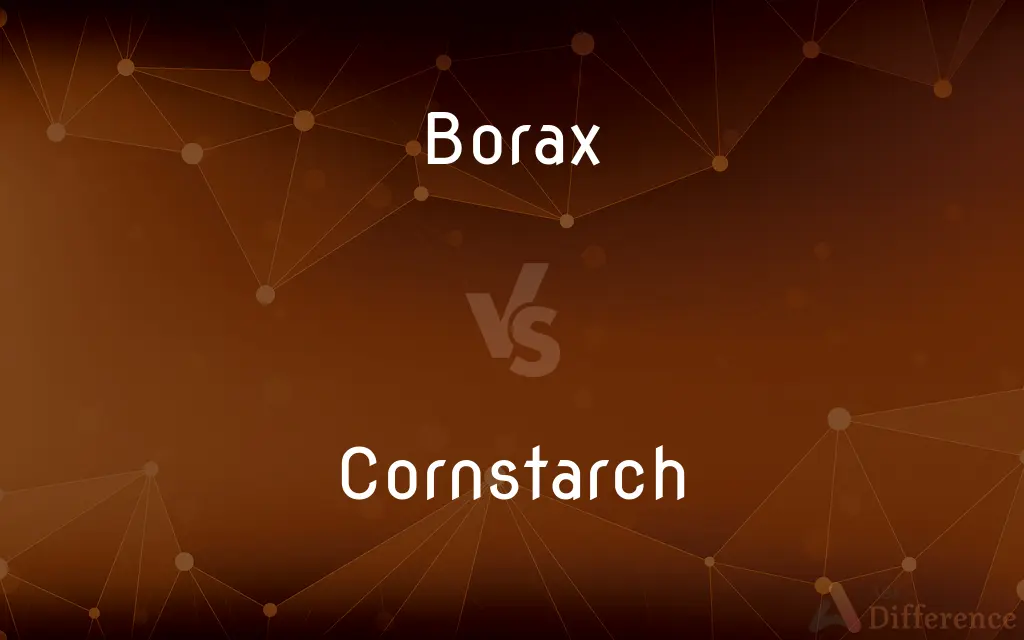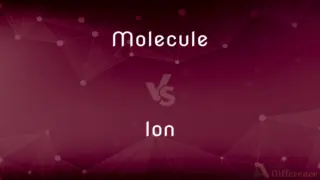Borax vs. Cornstarch — What's the Difference?
By Fiza Rafique & Urooj Arif — Updated on April 30, 2024
Borax is a natural mineral primarily used as a cleaning and laundry agent, while cornstarch is a carbohydrate extracted from corn used primarily in cooking as a thickening agent.

Difference Between Borax and Cornstarch
Table of Contents
ADVERTISEMENT
Key Differences
Borax, also known as sodium borate, is a mineral compound that finds extensive use in household cleaning products and laundry detergents. Whereas, cornstarch is derived from the endosperm of corn kernels and is predominantly used in the kitchen to thicken soups, sauces, and gravies.
Borax exhibits strong cleaning properties, effectively removing stains and neutralizing odors, making it a staple in many cleaning routines. On the other hand, cornstarch is valued in cooking for its ability to provide a smooth texture to liquids without altering their flavor.
In terms of safety, borax should be handled with care as it can be toxic if ingested or improperly used, which limits its use around food. Cornstarch, however, is safe to consume and is frequently used as an ingredient in recipes.
Environmental impact also differs; borax mining and processing can have significant ecological effects. Conversely, cornstarch production is relatively less impactful but does involve intensive agricultural practices associated with corn cultivation.
Borax functions well in high-temperature cleaning processes, effectively softening water and enhancing detergent performance. Cornstarch, however, loses its thickening power at very high temperatures and can break down, resulting in a thinner consistency.
ADVERTISEMENT
Comparison Chart
Primary Use
Cleaning and laundry
Cooking as a thickener
Source
Natural mineral (sodium borate)
Corn kernels (endosperm)
Safety
Toxic if ingested; safe for cleaning
Safe to ingest; food-grade ingredient
Environmental Impact
Mining and processing impacts
Agricultural impacts from corn production
Temperature Stability
Effective at high temperatures
Thickening properties decrease at high temps
Compare with Definitions
Borax
A naturally occurring mineral used in various household products.
Borax is often found in recipes for homemade cleaners.
Cornstarch
An ingredient in biodegradable plastics and adhesives.
Cornstarch is utilized in making eco-friendly packaging.
Borax
A buffering agent that maintains pH balance in swimming pools.
Borax was used to stabilize the pool’s pH levels.
Cornstarch
A common substance in powder form for soothing skin irritations.
Cornstarch can be applied to alleviate diaper rash.
Borax
An ingredient in crafting materials like slime.
Kids love using borax to make stretchy slime at home.
Cornstarch
A fine, powdery starch derived from corn used to thicken sauces.
She used cornstarch to thicken the gravy.
Borax
A fire-retardant material in certain applications.
Borax treated insulation helps reduce fire hazards.
Cornstarch
A base for many culinary desserts and sweets.
Cornstarch is essential in the preparation of custard.
Borax
A white crystalline compound used as a cleaning agent.
She added borax to the laundry to enhance the detergent’s effectiveness.
Cornstarch
An agent in paper products for a glossy finish.
Cornstarch is used to add sheen to high-quality paper.
Borax
Borax, also known as sodium borate, sodium tetraborate, or disodium tetraborate, is an important boron compound, a mineral, and a salt of boric acid. Powdered borax is white, consisting of soft colorless crystals that dissolve in water.
Cornstarch
Finely ground maize flour, used as a thickener in cooking; cornflour.
Borax
A white compound which occurs as a mineral in some alkaline salt deposits and is used in making glass and ceramics, as a metallurgical flux, and as an antiseptic.
Cornstarch
Starch prepared from corn grains, used industrially and as a thickener in cooking.
Borax
Good-natured teasing or ridicule; banter
They take a bit of borax, but that is part of the job
Cornstarch
A very fine starch powder derived from corn (maize) used in cooking as a thickener, to keep things from sticking, or as an anti-caking agent.
Borax
A hydrated sodium borate, Na2B4O7·10H2O, an ore of boron, that is used as a cleaning compound.
Cornstarch
Starch made from Indian corn, esp. a fine white flour used for puddings, etc.
Borax
Cheap merchandise, especially tasteless furnishings
"today's glinty borax" (New Yorker).
Cornstarch
Starch prepared from the grains of corn; used in cooking as a thickener
Borax
A white or gray/grey crystalline salt, with a slight alkaline taste, used as a flux, in soldering metals, making enamels, fixing colors/colours on porcelain, and as a soap, etc.
Borax
(chemistry) The sodium salt of boric acid, Na2B4O7, either anhydrous or with 5 or 10 molecules of water of crystallization; sodium tetraborate.
Borax
Cheap or tawdry furniture or other works of industrial design.
Borax
(transitive) To treat with borax.
Borax
A white or gray crystalline salt, with a slight alkaline taste, used as a flux, in soldering metals, making enamels, fixing colors on porcelain, and as a soap. It occurs native in certain mineral springs, and is made from the boric acid of hot springs in Tuscany. It was originally obtained from a lake in Thibet, and was sent to Europe under the name of tincal. Borax is a pyroborate or tetraborate of sodium, Na2B4O7.10H2O.
Borax
An ore of boron consisting of hydrated sodium borate; used as a flux or cleansing agent
Common Curiosities
Can I substitute borax for cornstarch in recipes?
No, borax is toxic and cannot be substituted for cornstarch in culinary uses.
What is borax used for?
Borax is primarily used in cleaning and laundry to remove stains, neutralize odors, and enhance detergent effectiveness.
Can cornstarch be used as a cleaning agent like borax?
No, cornstarch is mainly used as a thickening agent in cooking and not suitable for cleaning purposes.
How does cornstarch affect the texture of food?
Cornstarch thickens sauces, soups, and gravies, giving them a smooth, consistent texture.
Is cornstarch environmentally friendly?
Cornstarch is derived from corn, which requires farming, but it is considered more environmentally friendly compared to mining borax.
Can borax be used in swimming pools?
Yes, borax is used to stabilize pH levels in swimming pools.
Is borax safe to use around food?
No, borax is toxic if ingested and should not be used around food areas.
How does temperature affect the use of cornstarch in cooking?
Cornstarch thickens at a lower temperature but can lose its thickening ability if cooked at very high temperatures or for an extended period.
What are the safety concerns with borax?
Borax can be harmful if swallowed, inhaled, or if it comes in prolonged contact with skin.
How does the production of borax impact the environment?
The mining and processing of borax can lead to landscape disruption and other environmental impacts, such as water usage and chemical runoff.
Can borax be used in homemade crafts?
Yes, borax is a popular component in homemade slime and other crafts due to its chemical properties that help create unique textures.
What are some non-food uses of cornstarch?
Besides cooking, cornstarch is used in biodegradable plastics, adhesives, and as a soothing agent for skin irritations.
Is there a safer alternative to borax for household cleaning?
Yes, baking soda and vinegar are common non-toxic alternatives that can be used for many household cleaning tasks where borax would typically be employed.
Share Your Discovery

Previous Comparison
Scrummage vs. Scrimmage
Next Comparison
Molecule vs. IonAuthor Spotlight
Written by
Fiza RafiqueFiza Rafique is a skilled content writer at AskDifference.com, where she meticulously refines and enhances written pieces. Drawing from her vast editorial expertise, Fiza ensures clarity, accuracy, and precision in every article. Passionate about language, she continually seeks to elevate the quality of content for readers worldwide.
Co-written by
Urooj ArifUrooj is a skilled content writer at Ask Difference, known for her exceptional ability to simplify complex topics into engaging and informative content. With a passion for research and a flair for clear, concise writing, she consistently delivers articles that resonate with our diverse audience.
















































